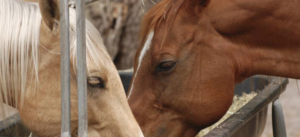
Aged Horses: Digestion of Grain and Hay. In the mid-1980s, research on digestion in Quarter Horse and Thoroughbreds over the age of 20 revealed something. Senior horses had reduced apparent digestion of protein, phosphorus, and fiber relative to younger horses. Both groups were fed pelleted alfalfa (lucerne). In fact, the digestive profile for these aged horses was very similar to that reported for horses that had 90% of their large colons removed.
Trials:
Two subsequent digestion trials on aged horses still showed reductions in digestibility. However, the differences, especially in protein, were not as apparent. In the first trial, horses were fed hay plus a commercial sweet feed or one formulated specifically for aged horses. After an adaptation period, fecal analysis showed differences in apparent digestibility. The senior feed yielded better digestibility of protein and calcium. The difference could have been related to higher intake of these nutrients in the senior feed.
In the second trial, aged mares were fed hay and a commercial sweet feed. In addition, daily injections of equine somatotropin. For these horses, analysis showed that apparent digestion levels of protein, phosphorus, and calcium were within normal limits.
Comparing Results:
Comparing results of digestion trials that used different feeds, horses, and conditions is somewhat risky. Sarah Ralston, V.M.D., Ph.D., the investigator who performed all the trials, said. However, the trend toward increased digestibility from older to more recent research has several possible explanations.
One potentially significant difference between the studies was that some of the horses in earlier studies were in thin body condition and had poor dental condition. Horses in the more recent studies were in fair to good body condition with no major dental abnormalities.
Advances in deworming products might be another factor that has contributed to more efficient nutrient digestion. With fewer parasites and less scarring of the intestinal surface, more recent generations of horses could be expected to have better digestion of protein, phosphorus, and fiber.
This idea has been borne out by some current findings on digestion of nutrients by older horses. Kathleen Crandell, Ph.D., equine nutritionist at Kentucky Equine Research, said, “Today’s older horses do not automatically require changes to their main diet if they are in good health and body condition. This is because no statistically significant differences in the apparent digestibility of energy, neutral detergent fiber, crude protein, fat, calcium, and phosphorus have been found as long as horses are otherwise healthy.”
In conclusion, do you have questions about Aged Horses: Digestion of Grain and Hay? Contact us at J & J Hay Farms by clicking here!
Resources:
Article by: Kentucky Equine Research
